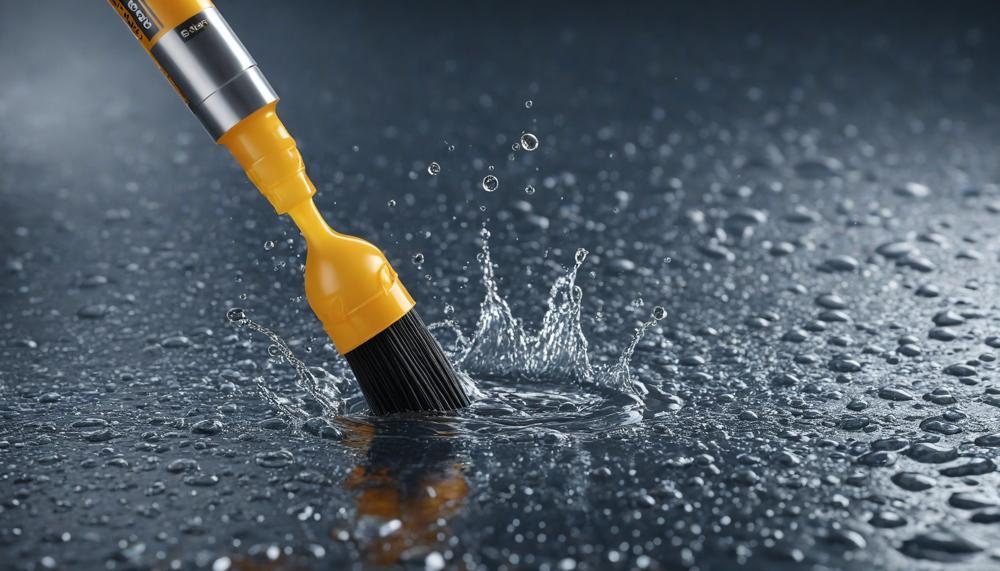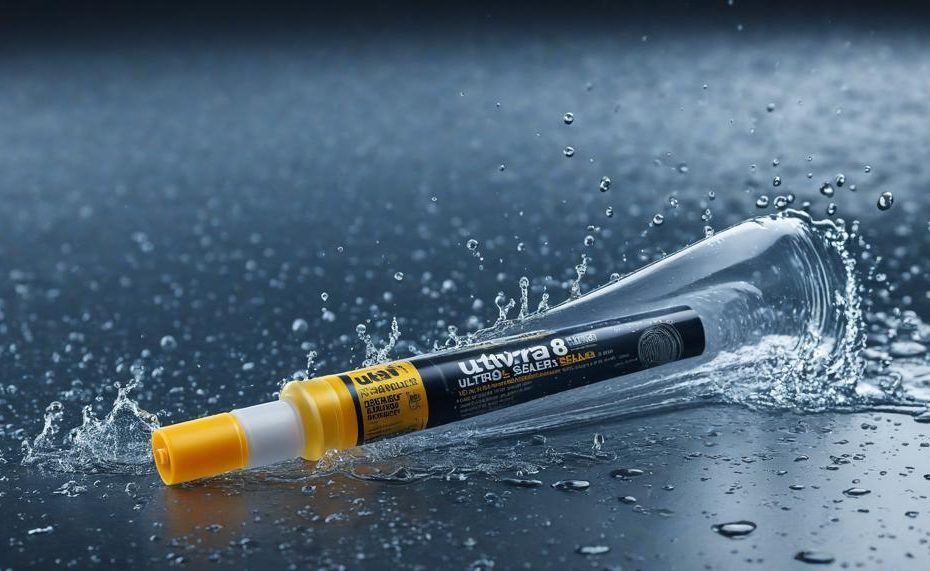When tackling DIY projects or essential repairs, having a reliable waterproof glue sealer is a game-changer. Whether you’re fixing a leaky pipe, sealing outdoor furniture, or crafting a masterpiece, the right sealer ensures your work stands the test of time.
Here’s a breakdown of what makes a top-notch waterproof glue sealer and why it’s an indispensable tool:
Key Takeaways:
- Strong Bonding Power: Ensures long-lasting repairs.
- Flexibility: Adapts to various materials and surfaces.
- Water Resistance: Protects against moisture and extreme conditions.
Types of Waterproof Glue Sealers:
- Epoxy Glue Sealers:
- Strength: Exceptionally strong and durable.
- Usage: Perfect for diverse surfaces.
- Cons: Requires precise mixing and longer curing times.
- Polyurethane Glue Sealers:
- Versatility: Bonds different surfaces effortlessly.
- Note: Expands during curing and can be messy, with a strong odor.
- Cyanoacrylate (Superglue) Sealers:
- Quick Drying: Fast-acting for immediate fixes.
- Limitation: Less resistant to prolonged water exposure.
- Silicone-Based Sealers:
- Flexibility: Handles extreme temperatures and weather conditions.
- Best For: Ideal for outdoor applications.
Choosing the Best Sealer:
- Application and Surface: Match the sealer to your project’s specific needs.
- Strength and Durability: Ensure the sealer can withstand the intended use.
- Environmental Resistance: Consider exposure to water, heat, and other elements.
Tips for Optimal Use:
- Surface Preparation: Clean and dry surfaces before application.
- Application: Apply the sealer evenly for a secure bond.
- Curing Time: Allow sufficient time for the sealer to set properly.
- Inspection: Check the bonded surface for any gaps or weaknesses.
A waterproof glue sealer isn’t just a product; it’s a necessity for ensuring your projects are resilient and enduring. By understanding the different types and their specific advantages, you can confidently choose the best sealer for your needs. Happy sealing.
Table of Contents
What Are Silicone Caulks And Sealants?
Silicone caulks and sealants are indispensable for many home improvement projects due to their distinct properties and versatility. Here are their key characteristics and uses:
Key Characteristics
| High Elasticity | Silicone sealants can stretch and flex significantly, making them ideal for areas prone to movement and temperature changes without losing their integrity. |
| Water Resistance | They are highly resistant to water, making them perfect for use in wet areas such as bathrooms and kitchens. |
| Durability | These sealants withstand extreme temperatures, UV rays, and challenging outdoor environments, ensuring long-lasting protection. |
| Flexibility | Silicone sealants remain flexible in various conditions, including freezing temperatures, which prevents them from cracking. |
| Resistance to Weather Variations | They can handle significant temperature variations, making them suitable for outdoor and high-humidity environments. |
Uses
| Bathrooms and Kitchens | Ideal for sealing areas around showers, bathtubs, sinks, and tiles due to their water resistance and flexibility. |
| Outdoor Projects | Perfect for sealing windows, doors, and other exterior applications because of their durability against weather and UV rays. |
| High-Humidity Areas | Excellent for environments with high moisture levels, as they prevent water penetration and mold growth. |
| Cold Regions | Useful in regions with freezing temperatures as they contract and expand without cracking. |
Silicone caulks and sealants offer a reliable solution for both indoor and outdoor applications, ensuring long-lasting, water-resistant, and flexible seals.
Common Uses for Silicone Caulk
Silicone caulk is highly versatile and commonly used in various applications due to its flexibility and waterproof properties. Here are some of the prevalent uses:
Bathroom and Kitchen Sealing
- Around Sinks and Tubs: It effectively seals the joints where sinks, bathtubs, and showers meet the walls and floors, preventing water infiltration.
- Countertops and Backsplashes: It fills gaps between countertops and backsplashes, providing a watertight barrier.
- Toilets and Faucets: Silicone caulk is used to seal around toilets and faucets, ensuring no leaks and maintaining hygiene.
Windows and Doors
- Weatherproofing: Applied around windows and doors, silicone caulk prevents drafts and water from entering, enhancing energy efficiency.
- Glass to Frame Sealing: Ensures a tight seal between glass panes and frames, crucial for double-glazed windows.
Outdoor Projects
- Siding and Trim: Used for sealing gaps in siding and trim, protecting the structure from moisture and pests.
- Roofing: Seals joints and fixtures on roofs, preventing leaks and water damage.
- Decks and Patios: Applied in cracks and gaps in wooden decks and patios to prevent moisture damage and wood rot.
Construction and Home Improvement
- Gaps and Cracks: Fills gaps and cracks in walls, floors, and ceilings, providing a smooth finish and preventing air and moisture infiltration.
- Expansion Joints: Used in expansion joints in concrete and other materials, accommodating movement and preventing cracks.
DIY Projects
- Aquariums: Safe for sealing aquariums, ensuring they are watertight and secure.
- Crafts: Used in various craft projects for its adhesive properties and flexibility.
HOW TO PICK THE BEST SILICONE PRODUCT
When selecting a high-quality silicone product, several crucial factors should be considered to ensure durability, safety, and performance:
Material Composition
- Flexibility: Ensure the silicone is flexible enough to adapt to various shapes without tearing.
- Heat Resistance: Check the product’s resistance to high temperatures, especially for cooking or industrial applications.
- Non-Reactivity: Verify that the silicone does not react with other materials or chemicals it may come into contact with.
Purity and Fillers
- Pure Silicone: High-quality silicone should be pure, without any fillers or additives. A simple ‘pinch test’ can help: pure silicone does not change color when pinched and twisted.
- No Fillers: Fillers can compromise the integrity and performance of the silicone. Ensure the product is free of these.
Certifications
- FDA Approval: For food-grade silicone products, look for FDA certification.
- BPA-Free: Ensure the product is labeled BPA-free to avoid harmful chemicals.
Durability and Performance
- Shape Retention: High-quality silicone maintains its shape over time and does not deform.
- Temperature Range: It should perform well across a wide temperature range.
- Sturdiness: The silicone should be flexible yet sturdy, capable of withstanding repeated use.

Brand Reputation
- Manufacturer: Choose products from reputable brands known for high-quality silicone manufacturing.
- Customer Reviews: Read reviews to gain insights into the product’s performance and reliability.
Odorless Nature
- No Chemical Smell: High-quality silicone should be odorless. A strong smell might indicate the presence of harmful additives.
Safety and Longevity
- Contact Safety: For products in contact with food or skin, ensure they meet safety standards.
- Longevity: Quality silicone should be durable, sustainable, and safe for long-term use.
Expert Tip
When it comes to using waterproof glue sealers, there are several expert strategies to ensure optimal performance and longevity of the seal. Here are some key tips to follow:
| Step | Action | Details |
| 1 | Choose the Right Sealer | Match the sealer to the material and environment for optimal results. |
| 2 | Surface Preparation | Clean and dry surfaces thoroughly to ensure a strong bond. |
| 3 | Application Technique | Apply a thin, even layer using appropriate tools. |
| 4 | Curing Time | Allow sufficient time for the sealer to cure based on environmental conditions. |
| 5 | Regular Inspection | Check and maintain the sealed area to ensure durability. |
Conclusion
Finding the perfect waterproof glue sealer is a critical step for any DIY enthusiast or professional tackling repairs and projects. The right sealer provides a sturdy, durable bond, and can withstand various environmental conditions, ensuring the longevity and integrity of your work.
Epoxy glue sealers stand out for their exceptional strength and durability. They are versatile, adhering well to multiple surfaces, but require precise mixing and longer curing times. Polyurethane glue sealers, on the other hand, offer great versatility and a strong bond, though they can be messy and emit a strong odor due to their expansion during curing.
Cyanoacrylate sealers, commonly known as superglues, are excellent for quick fixes, drying rapidly for immediate results. However, they are less effective for long-term exposure to water. Silicone-based sealers are particularly flexible, enduring extreme temperatures and weather conditions, making them ideal for outdoor applications.
Choosing the best sealer involves assessing your specific project needs, such as the materials involved and the environmental conditions. Proper surface preparation and application techniques are essential for achieving optimal results.






